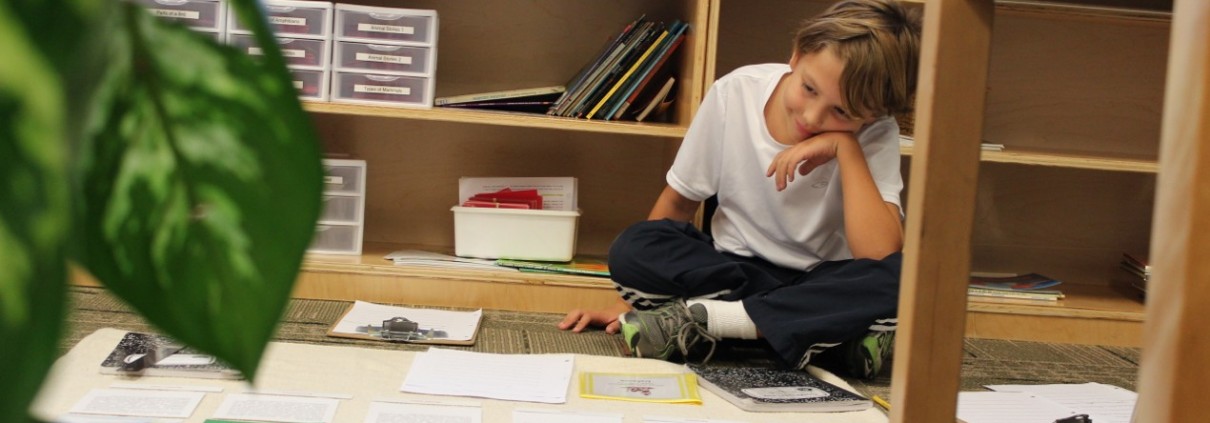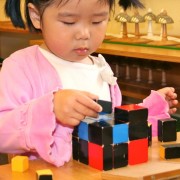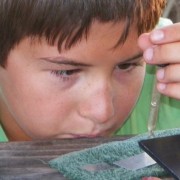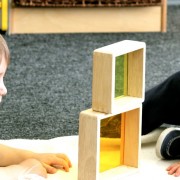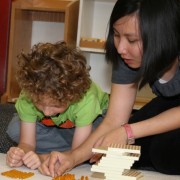Transitioning to Montessori: The Follow the Child Principle (Part 4 of 5)
Every fall, children transition to our Montessori programs from other preschools or elementary schools. What can parents do to help with this transition? In this series of blog posts, we lay out a few Montessori principles that apply at the later preschool and early elementary school level. Our focus is on children who transition into Montessori during their kindergarten through 2nd grade years, but many of the ideas suggested here are helpful for preschool children, too.
“It is true that we cannot make a genius. We can only give to each child the chance to fulfill his potential.”
“Free choice is one of the highest of all the mental processes.”
“The prize and punishments are incentives are incentives toward unnatural or forced effort, and, therefore we certainly cannot speak of the natural development of the child in connection with them.”
“It is not in human nature for all men to tread the same path of development, as animals do of a single species.”
— Dr. Maria Montessori
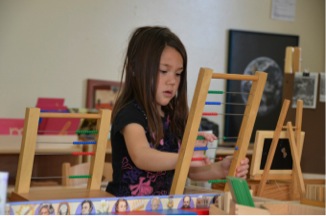
Visit many academically rigorous elementary school programs, and you’ll see ice cream party charts on the walls, treasure chests in the corner, and behavior points tallies next to the white board. Ask a teacher at such a school how she motivates a child, and these extrinsic rewards figure highly in her plan, as do punishments, such as loss of recess, notices to parents, poor grades, and visits to the principal’s office. To an observer, it may seem like rewards and punishments are indispensible to getting children engaged in learning.
Yet watch these same children—who, at school, have to be corralled into attention—outside of school, and you may find them focused intently on reading a book they have chosen for themselves, successfully playing a video game that even you can’t figure out, engrossed in making cookies with mom in the kitchen, or practicing for hours with their soccer ball.
If children can and will focus and work hard outside of school, without extrinsic motivators, why can’t they be similarly engaged at school?
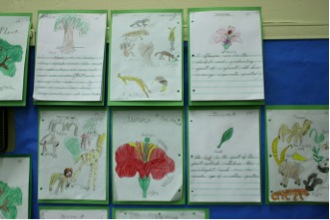
Our answer, it may not surprise you, is that they can!
In Montessori elementary school, we motivate children by their natural interest, not by stickers and rewards. We trust that they want to learn, if only we capture their attention by providing them with the right “points of interest” and offering work they find engaging.
We recognize that children are individuals. What motivates one may be dull for another; while one 6-year-old may be working on forming words, another one may be ready for writing stories; one child may need a quiet space to work alone, whereas another one thrives by working through math problems with a friend.
We aspire to help each child achieve the highest potential, and in fact, our academics are accelerated when compared to traditional elementary school (think 1st graders who write multi-story sentences in cursive; 2nd graders who do arithmetic into the millions!) What is different at our school is how each child meets these demanding academic standards. Rather than a one size fits all process, each finds his or her own path to success.
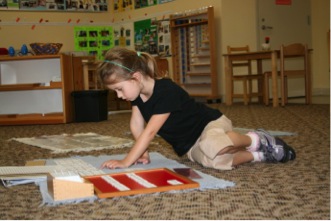
For example, a Montessori elementary school teacher who observes a boy’s interest in cars may give such a boy a very different writing assignment than another one who happens to be fascinated by the tide pool animals he saw on a recent trip to the beach. The universal need to practice writing is true for every child—but there is no similar need for every child needs to complete the same standardized work sheets!
We call this the follow the child principle—help each child maximize his or her potential by first understanding his or her needs. As teachers, it is one of our most important responsibilities to observe each child, to get to know her as an individual, and to tailor our teaching to her interests, strengths, and weaknesses.
As your child prepares for the start of Montessori kindergarten or elementary this fall, you may want to try following his interests. As a parent, you’re probably doing a lot of this already (after all, you know your child!), but paying conscious attention to guiding your child by respecting and nurturing his uniqueness can pay huge dividends.
- If you want to work on academics with your child over the summer, please don’t rely on workbooks. Instead, think about what your child loves, and tailor academic activities around that. Does he love art and animals, and can do some writing? Get him a digital camera (or let him borrow yours), and some story writing paper. Then set out to explore some of your local animal habitats and zoos. Armed with the camera and notebook, he’ll have plenty to write about on his return! We bet he’ll do more writing, more willingly, then if you had asked him to complete worksheets! Similar ideas can apply to math: engage your numbers-minded daughter in some cooking: have her figure out how to double or half a recipe; have her help you total up a rough estimate of the cost of the items in your shopping cart. For more ideas on supporting scientific exploration, read Encourage the Scientist in Your Preschooler.
- Have your child make more meaningful choices, and own the process of learning. Let your child choose some of the outings you take. And then put him in charge of more of the process: what do we need to pack for the pool? (He packs. No towel? He’ll remember next time!) How do we get there? (A map reading lesson!) Have her pick the books she’d like to borrow from the library (you can have some discussions afterwards on which ones she liked and disliked, and how to make better choices next time.)
- Go out and explore the world together! Much motivation to learn comes from “teachable moments”, and being out and about together on little adventures during summer time can offer plenty of these. Visit the tide pools (then read about them, research animals online, get books about ocean animals, write down the things you learn.) Do some theme-based reading: the Magic Tree House series provides a great jumping-off point for exploring different times and places. For example, if your son gets fascinated by the knights of the middle ages, follow his lead: Street Through Time is a great, child-friendly history book to explore. Then head out to Medieval Times to experience an (admittedly over-the-top) take on a medieval feast.
Following the child—getting to know each child as an individual and allowing that individuality to guide his learning—is a great principle for tailoring instruction in such a way that ensures that every’s child potential is actualized. It’s a great way to get children to enthusiastically tackle tough work assignments, and to help them rise to their potential.
Read more in our Transitioning to Montessori blog series:
- Transitioning to Montessori: Independence (Part 1 of 5)
- Transitioning to Montessori: Freedom with Limits (Part 2 of 5)
- Transitioning to Montessori: Motor Skills and Indirect Preparation (Part 3 of 5)
- Transitioning to Montessori: The Follow the Child Principle (Part 4 of 5)
- Transitioning to Montessori: The Prepared Environment (Part 5 of 5)

